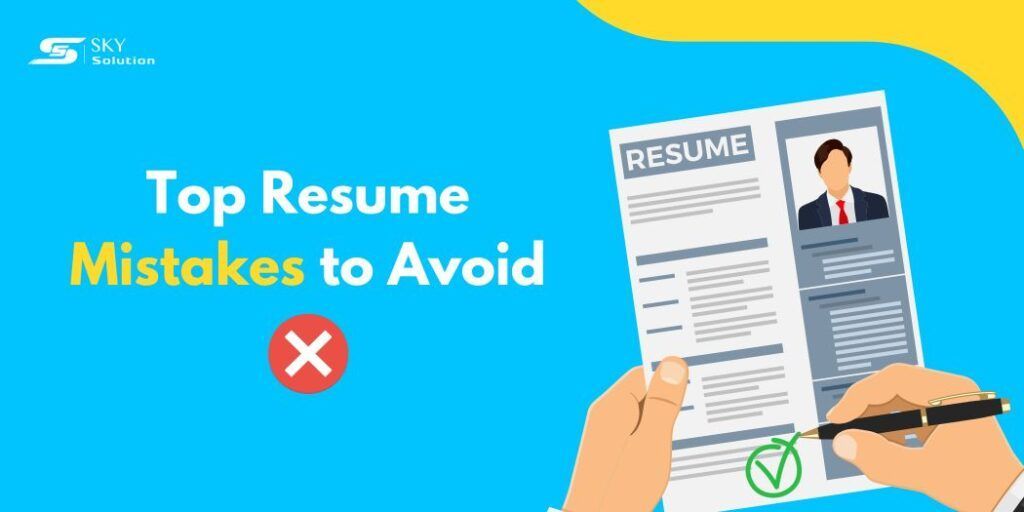In the competitive job market, knowing the resume mistakes to avoid can make all the difference in landing your dream job. Many candidates unknowingly sabotage their chances with common pitfalls. In this article, Sky Solution explores the top resume mistakes to avoid and offers practical tips for creating an effective resume.
Common Resume Mistakes to Avoid
- Mistakes in Spelling and Grammar
One of the most critical resume mistakes to avoid is making spelling and grammatical errors. These mistakes can create a negative impression and signal a lack of attention to detail to potential employers. A resume filled with errors may suggest that you do not care enough to present yourself professionally. Take the time to proofread your resume or enlist a friend to review it to ensure it’s polished and error-free.

- Writing Too Much
Another common resume mistake to avoid is writing too much. Your resume should be concise and to the point, ideally no longer than one page for most job seekers. Excessive information can overwhelm hiring managers and dilute your key achievements. Focus on including only the most relevant experiences and skills that directly relate to the job you’re applying for.
- Career Objective
Including a vague career objective is among the resume mistakes to avoid. Instead of a generic statement about seeking new opportunities, tailor your objective to align with the specific role. This shows hiring managers that you have a clear vision for your career and are genuinely interested in the position.

- Interests and Recreational Activities
Listing irrelevant hobbies and interests is another mistake to avoid. While it’s important to show some personality, ensure that your hobbies are related to the job or demonstrate transferable skills. Including unrelated interests can take up valuable space on your resume and detract from your professional qualifications.
- Outdated Resume Information
Failing to update your resume with current information is a critical mistake to avoid. An outdated resume can misrepresent your skills and experiences, making you appear less competitive. Regularly review and update your resume to reflect your most recent accomplishments and job responsibilities.
- Lack of Detailed Information
When creating your resume, it’s crucial to clearly articulate your responsibilities within an organization, the actions you took, and the measurable outcomes of those actions on the business.
If your descriptions of your previous roles are too vague, the hiring manager might conclude that you didn’t put much effort into your application or, even more concerning, that you were not fully engaged during your time at your last job.
- Non-specific Bullet Points
Using generic bullet points is another mistake to avoid. Generic descriptions fail to highlight your unique contributions and skills. Instead, customize your bullet points to reflect the specific responsibilities and achievements you had in each role, making your resume stand out to employers.
- Not Using a Professional Format
Neglecting to use a professional format is a common mistake to avoid. A cluttered or unorganized resume can be off-putting to hiring managers. Choose a clean, easy-to-read format with consistent fonts and clear headings to enhance readability and ensure a positive impression.
- Failing to Adapt Your Resume
One of the most significant resume mistakes to avoid is not tailoring your resume for each job application. Failing to customize your resume means missing out on the chance to align your skills with the specific requirements of the job. Tailoring your resume shows that you have done your research and understand what the employer is looking for.
Tips for Creating an Effective Resume
- Identify Keywords in the Job Advertisement
To create an effective resume, start by looking for keywords in the job posting. Incorporating these keywords into your resume helps ensure that it aligns with the employer’s expectations. This practice not only improves your chances of passing through applicant tracking systems but also demonstrates that you understand the role’s requirements and can meet them.
- Review Sample Resume for Your Industry
Another important tip for creating an effective resume is to review resume examples for your industry. Familiarizing yourself with the standard formats and expectations can provide valuable insights into what employers in your field prioritize. This knowledge enables you to craft a resume that resonates with hiring managers and increases your chances of securing an interview.

- Select an Appropriate Font
Using a professional font is a crucial aspect of creating an effective resume. Fonts like Arial, Calibri, or Times New Roman are often recommended for their readability and clean appearance. Avoid overly stylized fonts, which can distract from the content of your resume and make it difficult for hiring managers to read.
- Focus on Pertinent Details
When crafting your resume, it’s essential to include only relevant information. Focus on experiences and skills that directly relate to the job you’re applying for. This strategy ensures that hiring managers can quickly identify your qualifications without wading through unnecessary details.
- Use Active Language
Incorporating active language in your resume is vital for creating an effective document. Action verbs such as “achieved,” “managed,” and “developed” convey a sense of initiative and accomplishment. Using active language helps demonstrate your impact in previous roles and keeps your writing engaging.
- Highlight Significant Accomplishments
Highlighting important achievements is a key component of an effective resume. Use bold text or bullet points to draw attention to your most significant accomplishments. This technique not only emphasizes your successes but also helps hiring managers quickly identify your strengths.
- Limit Sections to Essential Headings
To maintain a clean and effective resume, only include subheadings and sections that you need. Avoid adding unnecessary sections that don’t contribute to your qualifications or the job you’re applying for. A streamlined resume is easier to read and makes a more substantial impact on hiring managers.
- Choose Appropriate Margins
Selecting appropriate margins is a simple yet often overlooked aspect of creating an effective resume. Standard margins (1 inch) help ensure that your resume looks professional and is easy to read. Consistent margins give your resume a polished appearance and help maintain a balanced layout.
- Proofread
Before submitting your resume, always proofread it thoroughly. This step is crucial for catching any errors or inconsistencies that could undermine your professionalism. A well-proofed resume is a strong indicator of your attention to detail and dedication to presenting yourself in the best light.

- Make Multiple Versions of Your Resume
Finally, consider making multiple versions of your resume tailored for different roles or industries. Customizing your resume allows you to highlight the most relevant experiences and skills for each position. This strategic approach enhances your chances of standing out and landing interviews.
In summary, avoiding common resume mistakes can significantly enhance your chances of landing a job. By focusing on spelling, tailoring your content, and using an effective format, you can create a standout resume. Remember the key resume mistakes that Job Sky Solution has highlighted to avoid, and implement the provided tips to ensure your resume captures the attention of hiring managers and helps you achieve your career goals.

